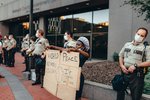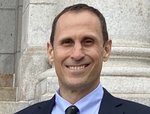

Minneapolis has a public safety crisis. Violent crime is up, and young people are at the heart of the problem. We need all hands on deck to find a solution.
Tray Pollard is one of those people taking the lead. Pollard is the founder and CEO of We Push for Peace, a nonprofit community organization based in Uptown that is working to reduce and deter crime by providing community-building and work training services to those in need. Pollard grew up in Chicago and turned his life around after spending over a decade in prison. Now, with We Push for Peace, Pollard is working to make a difference in the lives of our youth and community.
“As much as I want to try and reach every kid, I can’t. I know that is not realistic,” Pollard said at a Lowry Hill East Neighborhood Association Talk. “So the ones that I do come in contact with, I want to be most effective with. Honestly, it takes time. In that time is where you are building that relationship. And when you are building relationships, you are building trust. And when you are building trust, then you can effectively get these young men and women that we work with the help that they need.”
Pollard shared the story of a 17-year-old young man who had an aggravated assault and weapons charge as a juvenile. He wanted to change his ways after having a baby daughter but said he needed help. He started going to We Push for Peace sessions twice a week. Pollard helped him get an entry-level cashier job at Whole Foods. In under two months, he was a supervisor. Then he went through their training program to become an assistant manager.
Some kids are harder to reach than others. Pollard told another story of a 14-year-old young man with an extraordinary mother but no consistent male figure in his life. Before Pollard could work with this young man, he had nine felonies in 18 months. After he got out of a juvenile facility, he ran away from home, and within four days after being gone for nine months, he had committed the same crime.
“It’s real. It’s heartbreaking,” said Pollard. “I don’t advocate for anyone to be incarcerated or locked up. … That’s just the reality of what we’re dealing with. I’ve had several conversations with this young man, and he was just totally uninterested. So the plan now is to keep him facilitated until he turns 21. I don’t advocate for that. But that’s the best place for him to be.”
Pollard is not giving up on him and plans to visit him after he is incarcerated again. The young man will also need additional help and support behind bars to change his ways when he returns to society.
“That’s where we fail at a lot,” explained Pollard. “What I mean by that is he’s going in at 14. He’s coming out when he’s 21. What services do we have for him while he’s there to try to help him be rehabilitated? … I want to make sure those services are still provided for him wherever they wind up sending him.”
Childhood trauma is one of the biggest contributors to crime and violence. According to the Centers for Disease Control and Prevention, 64 percent of adults have at least one traumatic childhood experience, compared to 97 percent of the prison population. Early childhood trauma impacts brain development, emotional regulation, impulse control and increases the risk of addiction. If a person is unable to manage anger and impulses, it is very hard to keep a job and be a positive contributor to their community.
We need to find new ways to reach the traumatized to stop the violence and start the healing. This is no easy task. There is no universal fix to break intergenerational cycles of violence and trauma. But the revolving door of justice with no support system for rehabilitation doesn’t help anyone.
To break the cycles of violence and trauma, everyone in the public safety puzzle – from community members and parents to police officers, local government leaders, prosecutors, judges and policymakers – has to be accountable. We have to show compassion and wisdom. Community mentorship and support systems can fill the gaps. And they need more resources.
The Lowry Hill East Neighborhood Association (LHENA) plans to help. LHENA was chosen as the neighborhood to pilot a Community Public Safety Partnership program. This program is through the Minneapolis Office of Violence Prevention and is a partnership of Restorative Justice Community Action, Minnesota Peacebuilding Leadership Institute (Peacebuilding), and community leader Manu Lewis. The goal is to create a public safety model that works.
Learn more at bit.ly/mplspublicsafety.
Eric Ortiz lives in the Wedge with his family. When he’s not community building, he’s the director of media for Granite Media and writes bilingual children’s books with his kids. Their first book was “How the Zookalex Saved the Village,” available in English and Spanish on Amazon.
Comments
No comments on this item Please log in to comment by clicking here